A Dawn of Mammals Collection Read online
Page 23
She carried them in the front of her shirt back from the shore. Once there, she felt safer. It was a false sense of security, she knew, but whatever else might exist in this world to hurt them, she could bask for a moment in her ignorance of it.
Chapter 8
Garreth offered again to build a fire, but she told him to wait for when they found shelter. As long as not too many hours passed, the clams should still be fresh enough to eat. They all drank their fill and filtered more water for everyone else.
But a cleaner source of water had to be their first priority tomorrow. You can live without eating for a week, easily. In this heat—which was getting worse as the afternoon wore on—water was going to be a constant need.
One piece of good news was that when the rest of the group came back, they had found shelter.
“It’s perfect,” Nari said.
Bob said, “A bit snug, perhaps, for eleven, but it’s defensible.”
“Catch sight of any other water source?” she asked him.
He shook his head. “At least we have this.”
Ted and Garreth excitedly told the story of the animal they were calling “crocogator” and their battle with it.
Bob listened and then turned to Hannah. “True?”
“True. Even a little understated. I saw its teeth. They reminded me of shark teeth.”
“Hmm, describe it again.” When Hannah had, he said, “Maybe a champosaur.” He didn’t sound very certain, though.
“Extinct?”
“Quite,” Bob said. “Or it could be something else entirely. Caiman. Or something unknown in the fossil record.”
“It felt like a holdover from dinosaur days, that’s for sure.” She shook off the memory. “Did you see any other animals?”
He lowered his voice. “A snake. No one else saw it.”
“And?” she said.
“It was curled up, looking like a tree root to the casual eye, but it was as big around as my arm. Length?” He shrugged. “Twenty feet, I’m sure.”
“Oh, great,” she muttered.
“It might eat something else.”
“Than people? I certainly hope so.”
He smiled ruefully. “Better to know the enemy than not.”
“Do you think it’s a—” And then she noticed Dixie looking their way. “Later,” she said to Bob. What she wanted to know—and he wouldn’t have the answer anyway—was if it was a constrictor. Just what she needed, a twenty-foot snake dropping out of a tree onto her and squeezing the life out of her. Or worse—much worse—out of one of the kids.
“So, let’s fill the bottles again and get going,” she said, loudly enough for everyone to hear. “We’ll filter it back at the new camp.”
The others had marked the trail clearly enough to find the spot again, though it wasn’t in a straight path to the lake. After a half-hour of walking, they came to another ring of metasequoias. They were younger than the ones in the big ring had been, the trunks less striated, and they were spaced more closely. Inside the circle, there was the same bare ground, covered with old needles from the trees, and no other growth.
There was also that same sense of silence inside the ring. The sounds from the woods seemed quieter, and then she realized she’d been hearing sounds all along. Little animal chatters, bird squawks. Now that she attended to the sounds, she realized none of the bird calls sounded familiar. In fact, maybe they weren’t even bird calls at all.
While most of the kids worked at gathering wood, she held what she thought of as “doctor’s office hours,” where she checked everyone’s wounds, including her own. She had a tube of triple antibiotic ointment, and the wet conditions made her worry more about infection, so she used some on anyone whose wound still looked red, and on the recent ones. That included her own puncture marks on her thigh.
They had trouble finding dry wood for the fire. She had given her fire-starter to Bob to get the fire going, but he came back to her and handed it back over. “No luck. We’re trying with Dixie’s lighter, but no luck there, either. I think we need your ranger expertise.”
Hannah sent them out in a circle of twenty yards to hunt for tinder of any sort. She took one of the dryer kindling sticks and whittled at it with her knife until she had shavings. She added a used alcohol wipe, now dry, and cut it into tiny bits. Most of what the kids brought back to her had no use as a fire starter, but Claire did find a pod that, when broken open, had some dry stringy material in it, fine strands that should catch quickly.
“Good job,” she said to the girl, and added that to her little pile. She pulled out more and more vines until she was down to the bare earth, then she built a pile of small sticks to raise the fire off the wet ground. On a flat piece of bark, she set her tinder material. Then she lined up what she thought would be the most likely kindling to burn, in order of size. She was happy that most of the kids were watching her. These were skills they needed to learn. “Here goes,” she said, and flicked the lighter. She cupped her hand around it, though there was little breeze, and watched as a string of the pod material turned orange. The first of the shavings started smoldering. She barely breathed on them, willing them to catch.
A pop of orange flame made her smile. She began to feed in the tiniest of sticks. First they had to let out steam, and she was kept busy feeding in the fluffy bits to keep that process going. As the small sticks dried, they began to glow orange. It took fifteen minutes of babying the fire until she could feed in sticks as big around as her smallest finger. Even then, she realized it was going to be a few hours before they had coals enough to build a steam pit.
“Okay, we need to vote on something,” she said.
Rex said, “What?”
“Eat the clams raw tonight, or cooked tomorrow morning.”
Nari said, “Cooked.”
She let the kids discuss it. She was reminded to chew up some of her fern and spit it out, and had Zach do the same with his. Claire said, “I should be trying something too.”
“Tomorrow,” Hannah said. “We’ll get you testing a third plant.”
The kids voted, deciding to wait and eat the clams cooked tomorrow.
Bob said, “I think we should set watches tonight.”
She didn’t want to discuss his reasoning with him in front of the kids, so she just nodded. “Great idea. My wristwatch has an alarm.”
“My cellphone still has juice,” said Dixie. “There’s a timer function.”
“Great. Thank you for offering,” she told the girl. “We’ll pass Dixie’s cellphone along from watcher to watcher.” She turned to Laina. “Forty minute watches, you said?”
“Forty-three minutes and forty seconds,” she said without hesitation. “But forty is close enough.”
“I want to have my turn at about midnight,” Hannah said. “Otherwise, you guys work out the schedule.”
“Why midnight?” Jodi asked.
“I’ll put on the clams to steam. And we’ll have breakfast when everyone is awake.”
“Good,” said Claire. “I’m starving already.”
“Tomorrow, we work at making nets to catch fish,” she said.
“Maybe there aren’t fish,” said Claire.
Ted began to laugh, and told them of how Hannah had been startled by one. Hannah smiled as he told the story. She didn’t mind at all being the source of comic relief.
Heavens knew they needed some.
* * *
On her watch, Hannah left the shelter of the metasequoias and took her flashlight into the dark jungle. There were more animal sounds out there. Different ones. She heard an owl hoot. Or it could have been anything hooting, but it sounded like an owl and it soothed her to imagine it was one, that at least one sort of animal from her home time was alive back here too.
The steam pit was already dug, and the rocks lined up. She built up the steam pit coals with the clams in it, and covered them with vines, dirt, and more rocks. There was no grass, so she used fern fronds instead. The clams went n
ext, then more ferns. Building it took up most of her watch period. When the alarm went off, she shook Zach awake and handed over the watch duty to him.
The next day, after a breakfast of clams, eaten in a morning rain, she had four of the kids stay behind at camp to work on a net: Rex, because he had figured out the cord-making technique; Nari, because of her timidity; and Claire and Zach, chosen randomly. They were to gather the most pliable vines, bring them back into the shelter, and do their best to make a fishing net that could be cast from the bank and hauled up.
“You’ll need to tie rocks or some kind of weights into it,” she told them. “But not so much the whole thing sinks. Imagine it in the lake, under the surface, getting as many fish as possible. You guys are smart. I’m sure you can work it out.”
The rest of them went hunting for a better water source. She had them keep their eyes out for patches of greenery—though in this world, everything seemed green. “A stream would be best, but if we can’t find that, look for a different sort of plant in a patch, a low spot. That might mean there’s a spring.”
They moved in a spiral around their camp, all of them sticking close enough together that they could see each other. Every once in a while she glanced up, looking for a twenty-foot snake.
She found herself paired with Jodi for a time. “You working on the memorial service?”
Jodi nodded. “Maybe tonight at dinner? Or instead of dinner, if we can’t find anything to eat.”
“The ferns are working fine on me and Zach both, so at least we can eat those.” They’d eaten a few bites each after breakfast. If everyone got sick, it was the clams. If only she or Zach got sick, it would be due to the ferns. “But you’re right. I should be keeping an eye out for another plant to try next. You can help me.”
“Was M.J. religious?” Jodi asked.
It took a second for Hannah to change mental gears. “I don’t think so. But the point of a service is to comfort us. And Laina is Catholic, I know.”
“I guess maybe we should let everybody do or say what they want,” Jodi said.
“I think that’s a good idea.”
“Will you say something?”
The first thought in Hannah’s head was “I’m sorry.” That’s what she should say. She wondered if M.J. still existed in any form, and if he could hear it. Then she wondered, if there is an afterlife, is it time-dependent? Like, he could only hear it when I said it in the Oligocene? And if I say it here, is it too far away in time for him to hear me?
One for the philosophers. She put her mind back on looking for signs of a spring or river. She was getting thirsty. If they didn’t find something soon, they needed to go back to the lake and filter water all afternoon, dig more clams for dinner. And try not to get eaten by the champosaur—or “crocogator,” as the boys insisted.
Chapter 9
They didn’t find a spring, though the rain stopped mid-morning. On the way back to the camp at high noon, she and Bob talked it over.
He said, “I have to follow your lead on this one. I don’t know these woods survival techniques as you do.”
“I’ve been thinking as we walked. Trying to remember, dredge things out of the corners my mind.”
“Something that becomes more and more difficult the longer you live, you’ll find,” he said.
“You’re still plenty sharp,” she said. “What I remembered was that it’s better to find a spring higher than lower. Low springs can be polluted with minerals or animal waste. Higher springs have to come from an underwater source with pressure. Coming through rocks, there’s still the possibility of minerals dissolved, of course, but there’s also a filtering process.”
“I thought mineral springs were good.”
“Not if the minerals are arsenic or lead,” she said.
“Hmm, good point.”
“Sulfur could make people sick, but we’d smell that.” She said, “I’ve been at springs in volcanic rocks, in the Sierra Nevada Mountains, that smelled off somehow with the combination of minerals. So I’m going to rely on my nose. But I should try it first. Even after we find something, it’ll be a day before I’d be willing to let everyone else drink from it.”
“You take too much on yourself.”
“One of us has to be healthy, you or me. We can’t possibly risk leaving the kids alone, without an adult. Not until they’re better at survival.”
“I’ve been musing on that myself. Should we be teaching them something more?”
“I’ve taught most of what I know. I’m still learning myself. I think that’s how we’ll all have to learn, through experience.”
“Any wisdom on wrestling the champosaur?”
“Don’t,” she said, managing to laugh, now that the danger was well past. “Best advice on that one.”
“Too bad you didn’t kill it. I’m sure it’s edible.”
“It makes ferns a much more appealing food. They don’t fight back.”
Back at the camp, the net weaving was going well. Rex had figured out a way to integrate rocks for weight.
He said, “I’ve only put them along one edge, you see? I figured that it would drag the bottom part of the net down at the bed of the lake. We can tie the top edge to something, or maybe just hold it. We’ll leave longer vines up there, like for handles. And that way it’ll stretch from surface to bottom, and we will miss less fish.”
She nodded. “You’re a good natural engineer, Rex.”
He ducked his head shyly. “It’s just logic.”
“Not everybody has that talent, though. Terrific job. Looks like we’ll have a net soon.”
“Tomorrow afternoon, if we can have more workers tomorrow morning.”
“Done. Tomorrow, I’ll take out a small group to hunt for a water source, and you can put everyone else to work.”
She took Ted and Garreth out again to dig for more clams and gather water at the lakeside, and she took Claire and Jodi too, to learn the techniques. Training everyone she could in every skill was important. Which of them might not survive? At least a few people had to know everything she knew.
They managed to get both water and tomorrow’s breakfast without incident, but the murky surface of the lake, which in their own time might have looked soothing and inviting, seemed a threat to her now. She knew something terrible, with razor-sharp teeth, lurked there, and she was glad when they were finished and she could walk away from it unharmed. She spent a moment wiggling her fingers and appreciating that she still had ten.
Back at camp, Jodi was ready to start M.J.’s memorial service. They sat in a circle on the ground in the ring of metasequoias, and Jodi nervously began. “We’re gathered here to honor our friend and teacher, M.J. Hill, who passed away yesterday. Some of us believe he’s in a better place now, and I hope he is. We’ll miss him and his knowledge. He was so nice and encouraging to me when I found that squirrel fossil.” She smiled sadly. “It seems like years ago now.”
She looked around. “If anyone has something they’d like to say, or a prayer, or a quote, please join in. I know I haven’t given you much time to think of something, but it’s the thought that matters.”
There was silence for several moments. Then Bob cleared his throat and said, “I knew M.J. for the longest. He was always enthusiastic. A heck of a smart guy. A walking encyclopedia of fossil animals. I remember once there was an animal kill in the park, a muskrat, and he took me out to it about a week after it happened. I’m not sure what had killed the animal—maybe a bobcat or fox. But M.J. stood there and showed me how the animal’s bones were being dispersed as scavengers came in. He was looking for how that might help him to find bones at a fossil site, where an animal had been killed by a predator and then scattered by scavengers. He was endlessly curious like that, always working and thinking. He’ll be missed, for the way his mind worked, and for the person he was.”
Everyone sat and digested that. Laina offered a brief prayer and made the sign of the cross again, as she had when M.J. had been kill
ed. Others of the kids spoke briefly.
Hannah waited until a long silence had passed, and then she said, “I want to say to M.J., if he can hear me, that I’m sorry. It was my idea to take on the saber tooth, and that is what killed him. I said it back there, and if he can hear me, I say it again, and to all of you. I am so sorry.” She cleared the lump in her throat. “I know that M.J.’s last weeks of life were not comfortable ones. He was an addict going through withdrawals, and I know he missed being able to drink. If wishing did any good, I wish he hadn’t had to live those difficult times. If there’s a Heaven, I hope there’s wine there for him to drink, or that the craving for it has evaporated and left him in peace.” She could think of nothing else to add.
Garreth let a moment pass and then he said, “Herodotus—a famous historian—said that death is a delightful hiding place for weary men. That came into my head when Hannah talked about M.J.’s drinking problem. I hope it is delightful for M.J., and that we are the only ones who are suffering. No one has mentioned his wife. I don’t know her name, but I do know she must miss him, as all of our families must be missing us. I know that every one of us thinks about how we would love to get home. For me, I think, I’d be happy just to send a message. Mom, Dad, I’d say, please know I’m fine. Hannah and Mr. O’Brien are taking good care of us. If we can get back, we’ll get back. And I promise if we do, I’ll never be a jerk to you again.”
Hannah had no idea why those were the words that brought tears to her eyes, but they did.
Chapter 10
The next morning, they breakfasted on cooked clams and raw ferns, both species of which had set fine with Zach and Hannah. The new curled ferns in the morning were coated with dew as well, which helped slake their thirst.
She left Ted and Garreth to take one more person to gather water. “Be careful, you three. I mean super-careful. Do not engage the crocogator.”

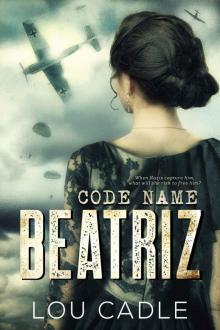 Code Name- Beatriz
Code Name- Beatriz Oil Apocalypse Collection
Oil Apocalypse Collection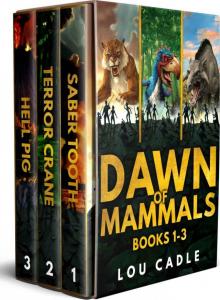 A Dawn of Mammals Collection
A Dawn of Mammals Collection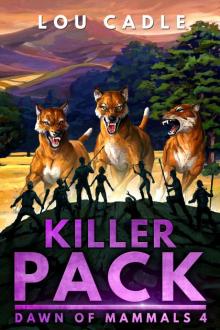 Killer Pack (Dawn of Mammals Book 4)
Killer Pack (Dawn of Mammals Book 4)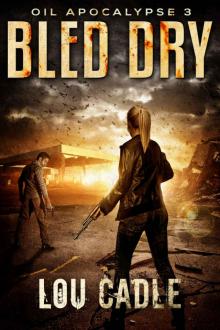 Bled Dry
Bled Dry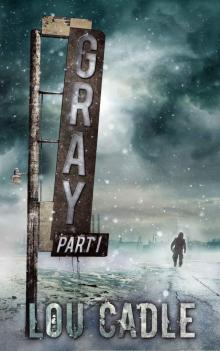 Gray (Book 1)
Gray (Book 1) Dawn of Mammals (Book 4): Killer Pack
Dawn of Mammals (Book 4): Killer Pack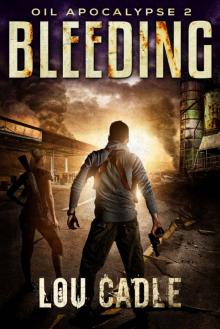 Bleeding (Oil Apocalypse Book 2)
Bleeding (Oil Apocalypse Book 2)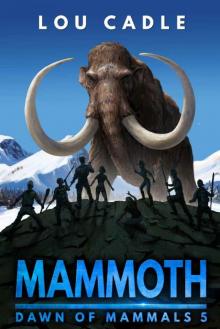 Dawn of Mammals (Book 5): Mammoth
Dawn of Mammals (Book 5): Mammoth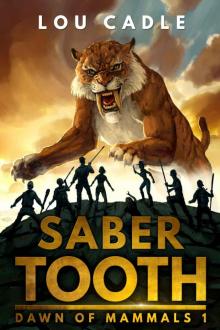 Saber Tooth (Dawn of Mammals Book 1)
Saber Tooth (Dawn of Mammals Book 1)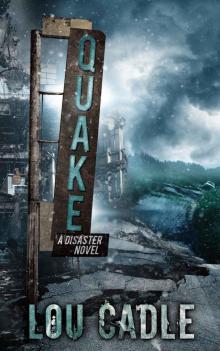 Natural Disaster (Book 2): Quake
Natural Disaster (Book 2): Quake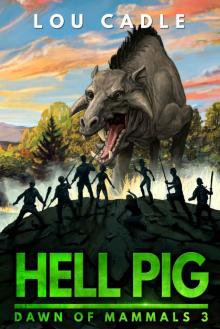 Hell Pig (Dawn of Mammals Book 3)
Hell Pig (Dawn of Mammals Book 3)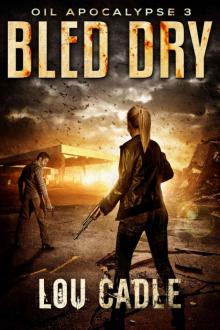 Bled Dry (Oil Apocalypse Book 3)
Bled Dry (Oil Apocalypse Book 3)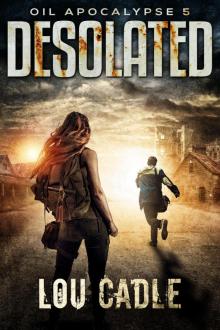 Desolated
Desolated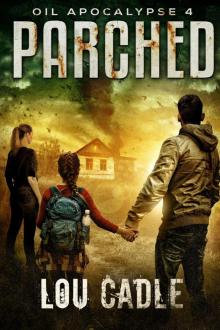 Parched
Parched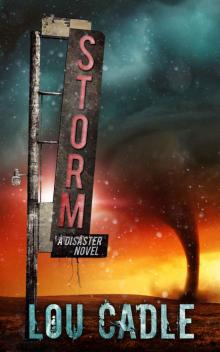 Natural Disaster (Book 3): Storm
Natural Disaster (Book 3): Storm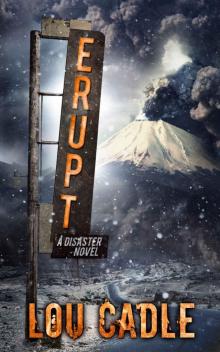 Natural Disaster (Book 1): Erupt
Natural Disaster (Book 1): Erupt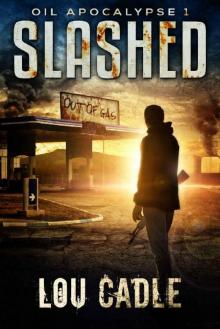 Slashed (Oil Apocalypse Book 1)
Slashed (Oil Apocalypse Book 1)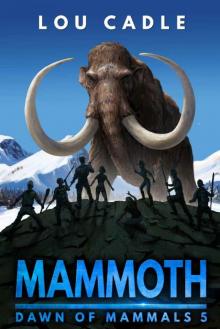 Mammoth (Dawn of Mammals Book 5)
Mammoth (Dawn of Mammals Book 5)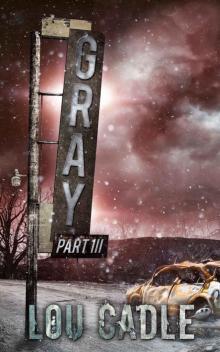 Gray (Book 3)
Gray (Book 3)